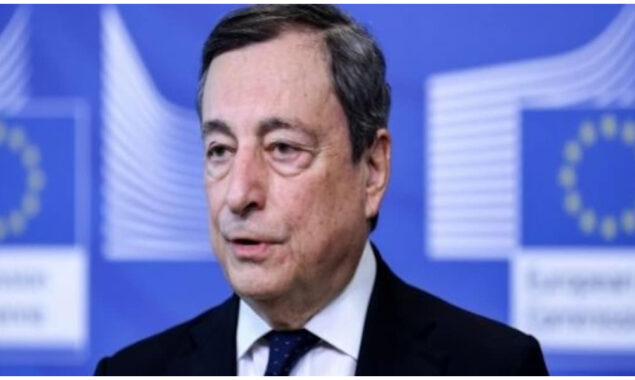
Italy PM in Algeria looking gas to reduce Russia credit
Italian Prime Minister Mario Draghi reached gas powerhouse Algeria on Monday as Rome steps forward in efforts to decrease its heavy reliance on Russian energy imports.
Italy purchases a vast majority of its natural gas from overseas, with about 40 per cent of those imports reaching from Russia.
But the war in Ukraine has provoked a European push for punishment against Moscow, including moves to drastically cut such purchases.
Rome is hoping its second-biggest supplier Algeria can boost output via an undersea pipeline in order to provide alternatives.
The Italian premier was invited by President Abdelmadjid Tebboune to discuss “reinforcing relations of cooperation between the two countries”, Tebboune’s office said, without giving more details.
Official news agency APS said the visit comes as the two countries enjoy “ever-tighter cooperation in all areas, but particularly as concerns gas”.
Italy is Algeria’s biggest gas customer, importing some 6.4 billion cubic metres of Algerian gas during the first quarter of 2021, a 109 per cent uptick from the previous year.
The war in Ukraine and the subsequent campaign of Western sanctions have prompted Italy, one of the most Russia-reliant gas importers in Europe, to step up efforts to find other sources.
– Spare capacity –
Draghi arrived in Algiers after Foreign Minister Luigi Di Maio made the same trip in late February when he confirmed that Italy was “committed to increasing energy supplies, notably in gas”, including from Algeria, which he said had “always been a reliable supplier”.
Algerian state hydrocarbons firm Sonatrach said at the time that it was prepared to increase deliveries, notably via the Transmed pipeline linking Algeria to Italy.
Its CEO Toufik Hakkar said Europe is the “natural market of choice” for Algerian gas, which accounts for about 11 per cent of Europe’s gas imports.
But he said any boost to exports would depend on first satisfying Algeria’s ever-growing domestic needs.
Sonatrach and Italian energy giant ENI jointly operate the Transmed pipeline, which has a capacity of some 32 billion cubic metres per year.
Former Algerian energy minister Abdelmajid Attar told AFP that “Algeria exports a maximum of 22 billion cubic metres (per year) via the Transmed pipeline”, leaving some 10 billion in spare capacity.
Attar, also a former CEO of Sonatrach, said that Algeria’s liquefaction facilities, which allow gas to be exported by ship, are “only being used at 50-60 per cent of capacity”.
But he noted that in the short term, Algeria could boost its gas exports to the EU by at most three billion cubic metres per year, meaning “it can’t make up for a fall in Russian gas supplies on its own”.
However, “within four of five years, Algeria could send bigger quantities” to Italy, he added.
Algeria expects to invest some $40 billion in gas and oil exploration, production and refining between 2022 and 2026.
Rome and Algiers have a contract for gas deliveries up until 2027.
Draghi told the previous week that Italy would “follow the decisions of the European Union” on new sanctions against Russia, including a possible gas embargo.
His visit also follows a pin in stress between Algeria and Spain, another major gas importer, behind Madrid dropped a decades-long policy of neutrality over Western Sahara and backed an autonomy plan put forward by Algeria’s arch-rival Morocco.
Sonatrach warned at the beginning of this month it could rise up in the price of gas sales to Spain, which compose more than 40 per cent of the country’s imports.
Read More News On
Catch all the Business News, Breaking News Event and Latest News Updates on The BOL News
Download The BOL News App to get the Daily News Update & Follow us on Google News.




